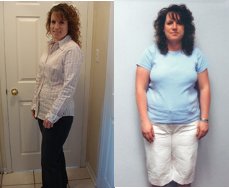By Isagenix Nutritional Sciences

Keeping bones strong is crucial for healthy aging because they provide the framework that supports our bodies, protects our organs, anchors our muscles, and acts as a reservoir for minerals, storing 99 percent of the body’s calcium and 85 percent of phosphorus.
Bone health is important at any age, but more important for women and the elderly, who are at a higher risk for bone loss, especially if they didn’t maximize their bone strength earlier in life. Bone mass develops all throughout childhood and continues well into a person’s twenties peaking during his or her early thirties.
Our bones become thinner as we age because after age 30, old bone is broken down at a faster rate than new bone is made. As this process occurs, our bones become weaker and are at a greater risk of breaking. Loss of bone mass also increases during hormonal changes that occur in menopause, which means women who are experiencing this time of change will need to take extra care to ensure their bones remain strong and healthy.
Weight-bearing exercise is the most important factor to stimulate bone density. In addition, getting enough calcium, vitamin D, and vitamin K2 is required for building strong bones.
Consume more calcium
Calcium is the most abundant mineral in the body, primarily found in the bones and teeth. As bones develop, calcium, along with other minerals, crystallizes on the collagen matrix of the bone, making it denser and giving it strength and rigidity. The body loses calcium continuously, and if this lost calcium is not replaced through diet, the body will remove it from the bones to perform its necessary functions. This removal causes bones to become soft and brittle, making them prone to fractures.
Adequate calcium intake is necessary for strong and healthy bones. The current recommended intake of calcium is between 1,000 mg and 1,300 mg per day (1-3). Good sources (more than 300 mg per serving) of calcium include dairy products, such as low-fat milk, cheese, and yogurt. Dark green vegetables such as broccoli, kale, and spinach can also add about 90 mg of this mineral. In addition, calcium-fortified foods (orange juice and breakfast cereals) and dietary supplements can also help fill gaps.
Vitamin D regulates calcium absorption
Most people rarely get enough vitamin D per day, especially in the winter. The bone-protective benefits of calcium cannot occur without the help of vitamin D. Vitamin D works to enhance the absorption of calcium. It is really a hormone named 25-OH cholecalciferol, or calcitriol. It stimulates DNA to synthesize protein receptors and helps maintain blood concentrations of calcium and phosphorus. If blood levels drop, then the minerals are leached from bone. The bones act as a reserve, so it’s important to consume enough of these minerals to maintain adequate blood levels, which allows bones to grow denser and stronger.
The new vitamin D recommendations were just increased to 600 IU daily for ages 1 to 70, and to 800 IU for ages 80 and above (2). The new recommendations are the target of a hotly contested debate in the world of nutrition research. Many vitamin D scientists were hoping to see 1,000 to 2,000 IU as the new recommended dietary allowance. Only a few foods contain vitamin D naturally, but this vitamin differs because the body can synthesize it in the presence of strong sunlight. Those who stay out of the sun, live in northern, cloudy or smoggy regions, or those who use sunscreen must be sure to get enough of this vitamin in the diet by consuming foods such as fatty fish, drinking fortified milk or taking vitamin D supplements.
Vitamin K2 for strong bones
Over the last decade, studies have found vitamin K2 to have a major role in maintaining bone strength. It may even be as important as calcium and vitamin D, making it one of the most interesting vitamins to research in years for scientists. The vitamin is also emerging as important for heart health. Although it is essential, this vitamin is often lacking in the diet.
Unlike vitamin K1 (phylloquinone), vitamin K2 (menaquinone) participates in the synthesis of bone proteins. One important part it plays is activating osteocalcin, a protein that incorporates calcium into bone tissue. Without vitamin K2, the protein cannot bind to calcium, affecting bone formation and causing bone density to be low. Studies have shown that higher levels of vitamin K2 correspond to greater bone density (7-10).
An adequate intake of Vitamin K2, along with calcium and vitamin D, keeps bones strong and protects against fractures. Vitamin K2 is produced by ”good” bacteria that reside in the digestive tract and is obtained from fermented foods, as well as meats, cheeses, eggs, and dairy. A recommended daily allowance for vitamin K2 has not been defined, although 100 mcg daily has been suggested for optimum bone health.
Isagenix Ageless Essentials Daily Pack

At Isagenix, we recognize that people rarely get enough calcium, vitamin D and vitamin K2 they need for long-term health from diet alone. For this reason, Ageless Essentials Daily Pack was designed to provide these nutrients in convenient AM and PM packets. The packets are taken in the morning and in the evening with meals and each contains the following:
- Calcium – 450 milligrams of calcium for women (900 milligrams total per day) or 400 milligrams of calcium for men (800 milligrams total per day). Calcium is supplied as five different kinds of calcium (carbonate, ascorbate, hydroxyapatite, citrate and gluconate) to take advantage of differing absorption rates and avoid oversaturating capacity. In combination with dietary sources, these dosages help with meeting nutritional needs for strong bones.
- Vitamin D – 1,000 IU of vitamin D (2,000 IU total per day). Experts on the “sunshine vitamin” largely support this dosage for optimum health beyond what is simply required for strong bones (4-7). Vitamin D is necessary for heart health, brain health, and much more.
- Vitamin K2 – 40 micrograms (total of 80 micrograms per day). At this dosage, the vitamin provides fundamental bone health benefits, as well as for heart health(8-10). Note: People taking blood thinners (such as Warfarin) should check with their doctors before using this supplement because vitamin K is involved in blood clotting.
Don’t forget weight-bearing exercise
To help maximize bone density, make sure to engage in weight-bearing activities regularly. Weight-bearing exercise causes muscles and tendons to pull on the bone, which stimulates new bone tissue to form. This results in stronger, denser bones. Studies show that participating in routine weight-bearing exercises can help increase bone density at any age.
Weight-bearing exercises can include training with dumbbells or weight machines, but also can include any activity that involves the weight of your body against gravity — such as walking, jogging, dancing, aerobics, or tennis. (Cycling and swimming are not considered weight-bearing exercises.) For optimal bone health, one should aim to participate in weight-bearing activities two to three times a week. As always, it is recommended to consult your doctor before beginning any exercise program.
In conclusion, minimizing bone loss can be achieved by maintaining adequate nutrition. This includes consuming plenty of calcium, as well as ensuring you are getting enough vitamin D and vitamin K2, all of which play a role in bone metabolism. In addition, engaging in regular weight-bearing exercise can also help prevent bone loss by helping to strengthen bones. Following these tips can give you the best possible chance of optimizing bone health throughout life.
Sources
1. Groff and Gropper. Advanced Nutrition and Human Metabolism. 2000.
2. IOM. 2010.
3. Shils et al. Modern Nutrition in Health and Disease.
4. Effect of vitamin D on falls: a meta-analysis. Bischoff-Ferrari et al. JAMA. 2004 Apr 28;291(16):1999-2006.
5. Effects of vitamin D supplementation on strength, physical performance and falls in older persons. Latham, Anderson & Reid. A systematic review. J Am Geriatr Soc. Sep;51(9)1219-26, 2003 [ABSTRACT].
6. Oudshoorn C et al. Ageing and vitamin D deficiency: effects on calcium homeostasis and considerations for vitamin D supplementation. British J Nutr. 101:1597-1606, 2009.
7. Shiraki et al. J Bone and Mineral Res. 15(3):515-521, 2000.
8. Koitaya et al. Effect of low dose vit D2 (MK4) suppl on bioindices in postmenopausal Japanese women. J Nutr Sci Vitaminol 55,15-21, 2009.
9. Gast GC et al. Nutr Metab Cardiovasc Dis. Sept; 19(7):504-10, 2009. [ABSTRACT].
10. Geleijnse JM et al. The Rotterdam Study. J. Nutr. 234:3100-05, 2004.










